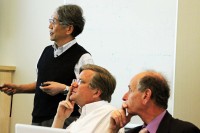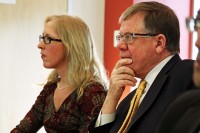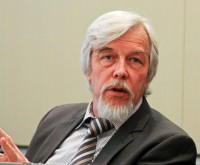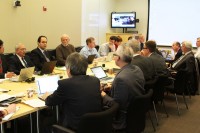The Funding Agencies for Large Colliders (FALC), an informal committee of particle physics funding agency representatives, held their eighteenth meeting at SLAC on 22 January 2010. I previously reported on an interesting exchange meeting between the Global Design Effort Executive Committee and FALC that took advantage of the fact that their meeting immediately followed our second Baseline Assessment Workshop, which was also held at SLAC. I report today on some highlights from the FALC meeting.
FALC is a unique forum that provides the opportunity for representatives of the world’s particle physics funding agencies to regularly meet and jointly discuss their planning and programmes for large international projects and collaborations. Its original purpose was to carry out such discussions solely for the ILC and has continued that role while broadening its mandate. It now includes discussions ranging from major international projects to strategic planning.
In addition to the reports on the ILC from the GDE there were reports on long-term plans and R&D projects (2011-2014) of the major laboratories in the three regions.
Importantly for the ILC, Rolf Heuer, director general of CERN, gave a detailed and very encouraging report on the LHC progress and the prospects for the next data run. He showed that with the higher beam intensity and a long data run through 2012, the LHC will have good sensitivity to discover or rule out the Higgs boson in the favoured mass range. As we prepare the ILC Technical Design Report, we will be keeping close tabs on LHC results, which could well inform the motivation and even the parameters of the ILC.

Atsuto Suzuki, director of KEK, reports to FALC. Jon Bagger, chair of ILC Steering Committee and Michel Spiro, chair of the CERN Council, are in the foreground.
Roberto Petronzio, INFN president, made a presentation by video on the status of the Super B project in Italy, which was approved at the end of 2010 along with a schedule for funding and construction. He discussed the siting, where the choice is anticipated soon. He said that Super B is on the list of flagship programmes in Italy that has been established for the period 2010-2015. The Italian government is seeking international collaborations through memoranda of understanding. The plans anticipate the re-use of the PEP magnets as a major US contribution. Petronzio noted that US participation was very welcome, but not critical to the implementation of the project.
Atsuto Suzuki, director general of KEK, also presented the status of JPARC, KEK and SuperKEKB. He reported on progress toward SuperKEKB, which he said was on track, with initial budgets approved and growing international commitments.
In addition to the various laboratory and project reports, Michel Spiro, president of the CERN Council, provided an update on the plan to establish a European Draft Strategy Document, which would constitute the proposal for the update of the European strategy for particle physics/), adopted in 2006. The European strategy update will be submitted for approval by the CERN Council in September 2012. A major point on the strategy update timeline will be the International Committee for Future Accelerators (ICFA) seminar discussions, to be held in October 2011, on global perspective on roadmap(s). The next meeting of FALC will be held immediately following that meeting at CERN.
One conclusion from this FALC meeting is that timing of the ILC Technical Design Report appears well aligned with other timelines, including the ICFA seminar next fall, the conceptual design report for the Compact Linear Collider (CLIC) Study in early 2012, the European strategy update and the results from the next LHC data run. We will take these various developments into account, as well as be able to make inputs into the European strategy update.





Recent Comments